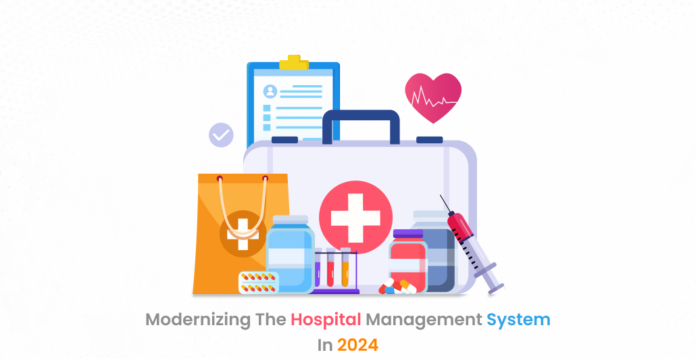Introduction
Hospital Management Systems (HMS) is designed to solve optimization problems and consider software solutions for better facilities of healthcare. These systems manage the whole hospital including clinics and other institutes of medicine. HMS has a range of functions to manage appointment schedules, billing, and payment processes. The hospital management system controls all workflows to enhance patient care and regularly improve the system accessibility.
The goal of the Hospital Management System is to digitize and centralize all parts of hospital management that allow healthcare providers to deliver quality care to patients. Healthcare facilities can consider tasks such as schedules of appointments, medical records history, treatment plans, and lab reports. HMS reduced the paperwork and also minimized errors to improve the accuracy of information. HMS provides a communication system to communicate with healthcare providers.
Overview Of Hospital Management System
Hospital Management System (HMS) ensures the changing of healthcare industries. This is a hospital management system advantages of the modern healthcare systems that consider efficiency, accuracy, and better management of hospitals. A system that analyzes patient’s medical information and scheduling of appointments are provided in one platform. Financial management is a part of the hospital management system to handle billing, insurance, and revenue of the hospital and clear the vision to make sure of quick outcomes for patients. It can transform data into a hospital for making decisions to improve efficiency. In the end, HMS are modern healthcare technology to simplifies processes, and accuracy and improves care of quality. Those tools are making it more efficient to deliver better patient care.
What Is a Hospital Management System?
A Hospital Management System (HMS) is a digital software facility of healthcare that works on a patient’s recovery or care. It is the best software solution for running on hospital parts to consider the best treatment provided. HMS has the ability to allow the registration of patients for creating patient records in the software system. HMS providing schedules and appointments with doctors also centralize a staff that can allow slots of appointment and automated reminders to patients.
Hospital Information Management Systems are the management system of electronic medical records that ensure the storing and patient’s medical histories, treatment plans, laboratory results, and reports. EMR allows access to healthcare providers for patient details, making decisions, and personal care. HMS helps with the administration of lab tests, results, and reporting in establishments that include laboratories. It makes sure that lab equipment and EMR integrate seamlessly, facilitating effective data transfer and analysis.
By automating the billing process, The hospital management system online generates precise bills that are based on the services rendered, medical procedures carried out, and prescription drugs dispensed. To guarantee prompt and effective financial transactions, it also records payments and manages insurance claims.
A hospital management system india has a wide range of medical supplies, devices, and prescription medicines handled by hospitals. An HMS facilitates utilization tracking, inventory level management, and supply reordering as needed. By doing this, waste is decreased, stockouts are avoided, and the availability of supplies needed for patient care is guaranteed.
An HMS has tools to handle pharmacy operations for hospitals that have on-site pharmacies. Medication administration, inventory control, prescription administration, and patient medication histories are all included in this. With the advent of several HMS systems, medical professionals may now electronically email prescriptions to pharmacists. This increases drug adherence, lowers prescription mistakes, and improves the security of patients.
Here, Let’s See Modernizing the Hospital Management System in 2024
The Hospital Management System (HMS) continues to evolve in the ever-changing healthcare industry to meet the demands of the digital age. We must personalize these changes as we approach 2024, emphasizing how they will directly affect patients, healthcare professionals, and the standard of care as a whole.
Imagine a hospital where machine learning and artificial intelligence (AI) algorithms discreetly operate in the background to assist clinic management systems in anticipating patient requirements and averting any health problems before they happen. Empowering healthcare practitioners to give proactive and individualized treatment is the real goal here, not merely focusing on technology. Patients gain from this as well as their customized therapy regimens taking into account their particular health issues.
Another advancement in hospital queue management system upgrading is the implementation of telemedicine. Envision a patient recovering at home and receiving guidance from their physician through video chat. This is additionally useful, but it also protects the lives of those who struggle to keep appointments. The objective is to guarantee patients receive the necessary therapy wherever they may be by offering them quick accessibility to healthcare.
Notwithstanding these advancements, issues persist. Even though incorporating current technologies could be scary, healthcare practitioners can safely embrace these improvements with the right supervision and help. Patient confidentiality and confidence are guaranteed by adhering to legislation like HIPAA.
Embracing cutting-edge technology like wearables, telemedicine, blockchain, and machine learning is part of the process of modernizing HMS. With features like video conferencing that allows treatment to be given to patients in their homes and predictive analytics that predicts their needs, these developments have the potential to completely transform the way hospitals run. Modernizing healthcare means putting people first and relating to the process rather than merely focusing on technology.
Conclusion
In the end, One of the main goals of modernizing the hospital management system modules
in 2024 is to improve the experience of patients through the use of medical technology. It all boils down to putting the patient at the center of the treatment plan developed by the medical professionals and supplying the resources required for them to deliver proactive, individualized care. We establish a healthcare system that is more open, effective, and committed to raising everyone’s standard of living. One essential instrument in the advancement of the delivery of healthcare is the Hospital Management System (HMS). The job of HMS extends beyond simple administrative tasks as we negotiate the complexity of the healthcare environment in 2024. It is a driving force behind progress that improves patient care, boosts operational effectiveness, and produces better results for patients and healthcare professionals.
Author Bio:-
Name:- Hemant Patel
Description:- Hemant Patel is an SEO executive at Healthray Technologies. He works to rank websites on the search engine using on-page, off-page, technical, and keyword research activities. He also optimizes websites using his own skills and strategies.
















